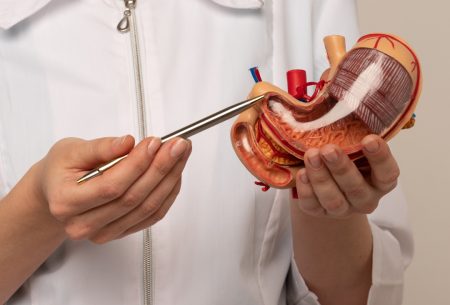Genetics aren’t the only thing we get from our mothers, we get microbes too! Whether that be via delivery (vaginal and gut microbes), snuggles (skin microbes) or breast milk (milk microbes), we have a lot to thank them for. I may be biased but one of the best gifts a mother gives is… our gut microbiota (or GM, the trillions of microbes living in our gut).
It’s during pregnancy, at birth and during breastfeeding that babies get much of their mothers’ gut bacteria, so pregnancy is a super important time to focus on your gut health. Not only can it help to support a healthy pregnancy, but also the future health of the baby even after they’re born. Amazing, isn’t it?
A 2020 study published in Gut Microbes showed that, as a mother’s nutrition during pregnancy not only shapes their own GM, but this in turn influences the GM of their baby – and may even affect growth during infancy (particularly for the first 18 months).
On a closer look at their diets during pregnancy, those who ate a diet high in fibre, omega-3 and polyphenols (health-promoting plant chemicals) had a positive effect on the baby’s GM, as well as their overall development and health.
So how can mothers-to-be care for their own gut health to support baby’s future health?
Top tips to nourish your (and baby’s) microbes during pregnancy and beyond:
- If you’re considering antibiotics, double-check with your medical doctor whether they really are necessary. Remember things like the common cold are caused by viruses, not bacteria, and therefore antibiotics (which target bacteria) don’t work! That being said, if you need to take them, then, of course, take them.
- Hit your 30g fibre per day and aim for 30 plant points a week. That’s 30 different plant-based foods a week, across all six plant food groups: fruits, vegetables, wholegrains, legumes (beans and pulses), nuts and seeds. For good gut health, diversity is key, as each different plant food contains different types of fibre and beneficial chemicals that feed different bacteria. I know this can feel impossible at times, particularly if you have bad morning sickness, but small tweaks can make a big difference. Check out my tips here.
- If you have a family history of eczema, there is decent evidence for taking a specific probiotic, with research suggesting it can reduce the risk of your baby getting it by nearly half. Check out my ‘probiotic prescriptions’ for the full details, because remember not all probiotics do the same thing.
- Get prepped for breastfeeding if you can. Breast milk is pretty magical stuff, particularly when it comes to developing bub’s own GM. In fact, breast milk actually includes both prebiotics (food for bub’s microbes, not bub!), of which over 100 different types have been identified, as well as an array of live microbes themselves and a range of other immunity supporting chemicals. But there is no denying breastfeeding, as ‘natural’ as it is, can be hugely challenging, so please do get the help you deserve to be empowered to take on what is often the BIGGEST challenge for many mums, myself included! For support with breastfeeding, visit The Breastfeeding Network, Breastfeeding USA and more internationally (depending on which country you’re in). If breastfeeding isn’t an option for you, don’t beat yourself up, there are lots of other things you can do to nourish your baby’s gut health.
- Keep moving your body every day, whether that be going for a brisk walk, taking a pregnancy dance class, going for a swim or even walking to the shops and back… try to get outside and stretch among nature daily (as long as your GP/physician says it’s ok!).
- De-stress to rewire that gut-brain axis. I find daily yoga and mindfulness meditation helps so much, even just 5-10 minutes a day can make a significant difference, not just on your health but studies suggest your bub’s too.
Finally, as a mum-to-be, don’t put too much pressure on yourself! The most important thing is that everyone’s different and you have to do what feels right for you personally – without any guilt. Happy mum, happy microbes, happy baby.
If you’re pregnant and experiencing common pregnancy gut symptoms such as nausea, constipation, reflux, wind and bloating, read on for what you can do about them…
Nausea
I’m going to avoid calling this ‘morning sickness’ as we all know it doesn’t just come in the morning! This nausea is caused by hormonal changes in pregnancy, combined with the digestive tract not moving as efficiently. The good news is that it usually goes away by the second trimester. If you struggle with vomiting frequently, it’s best to get medical attention, as you might need extra support with nutrition and hydration.
Top tips for nausea relief
- Eat little and often and avoid getting really hungry, try 6-8 small meals per day.
- Choose complex carbs such as sourdough bread, oats and wholegrain crackers and pair with a source of protein – why not try homemade seedy oatcakes using oats and mixed seeds (there’s a recipe in my book) served with nut butter or cheese & cucumber.
- Try ginger, which is a natural anti-nausea (best chat to your GP/physician first in case it’s not suitable for you). I loved ginger chews!
- Try to get some fresh air every day, mindful walks can be very relaxing, or simply using an app such as Headspace for some mindfulness meditation.
- Choose cold foods as they smell less. Chilled fresh fruit or crudité can be refreshing.
- Make the most of the days you’re feeling okay to prepare high fibre snacks, such as seedy crackers or salted roast legumes (beans and pulses)
- Don’t force down salad if it’s going to make you sick. Stick to comforting foods and add goodness where you can, such as adding lentils and spinach into a pasta sauce, or make smoothies with veggies.
- Ask for support from trusted family and friends if you can, this may be with food shopping, caring for existing children or just for emotional support and someone to talk to.
Constipation
This is a very common pregnancy gut symptom, affecting up to 40% of pregnant women! It can start as early as a few weeks after conceiving, as the rise in the hormone progesterone slows the gut movements down.
Diet plays an important part, especially as many women during pregnancy find lower fibre foods more palatable when feeling nauseous (plain crackers and potato chips, anyone?).
Having low energy levels can also contribute to constipation, not only due to having less energy to cook healthy meals, but many may become less active. In later pregnancy, as the baby takes up more space, this can contribute towards constipation thanks to the movement of the intestine and the gut becoming a little squashed.
Aside from feeling quite uncomfortable, pregnancy constipation could lead to things like prolapse or haemorrhoids over time, so chat to your healthcare team if you’re having trouble combatting constipation.
Top tips to manage pregnancy constipation
- Keep moving, inactivity can slow down your gut, so do what you can. A gentle walk outside or a relaxing yoga flow can do the trick too.
- Fill up on fibre and try to hit 30g a day. As a general guide, this means aiming for around two pieces of fruit, five portions of vegetables, three portions of wholegrains and one or two portions of nuts, seeds and legumes every day. If you’re starting from a low intake, build-up to this gradually to let your gut adapt
- Sprinkle seeds on your cereal, porridge, soup – flax and chia are especially higher in fibre (but you must also drink extra fluids)
- Prunes and kiwi can also help get things moving, so try these as a daily snack (50g of prunes and 1 kiwi fruit a day)
- Stay hydrated, aim for around 8 cups per day of water
- Check your poop position. For a smooth poop departure, take up the squat position with a stool under your feet – you can find a guide to better bowel habits in Love Your Gut
Wind & bloating
These pesky symptoms are usually secondary to constipation, so upping your fibre, fluids and gentle activity may be enough. Remember, a bit of bloating and wind can be totally normal – and actually a sign of a healthy gut! But, if it’s constant and becoming bothersome, here are some things you can try.
Top tips for beating the bloat:
- Chew your food well, try to aim for 10-20 chews per mouthful, depending on the food
- Split your food intake into smaller portions throughout the day
- Try to avoid eating ‘on the go’ and, instead, sit and take your time with meals
- Skip the sugar-free foods with added polyols (such as mannitol, maltitol and xylitol)
Reflux
Reflux affects nearly half of pregnant women and usually comes during the last trimester, as the pressure of your growing baby limits space in the stomach and can allow food and acid to move back up the wrong way.
Top tips for pregnancy reflux:
- Try to avoid eating late at night, it can help to leave a 3-hour gap between eating and sleep
- Eat little and often, go for 6 small meals per day
- Limit super high-fat meals, as these take longer to leave the stomach
- Limit spicy foods
- Continue to watch the caffeine (this relaxes the entrance to the stomach) – you may even want to cut it completely
- Raise the head of your bed at night
And for all those asking about what type of milk I give Archie in his morning and evening bottle, who is now 15months… it’s fermented full fat milk (i.e. drinking natural yoghurt or shop-bought kefir). There is a wealth of science backing fermented dairy, so from 12months I’ve opted to give Archie fermented cow’s milk. I go for shop-bought options to reduce any risk of over fermented batches (which my gut can handle fine, but maybe a little strong for a baby). Of course every baby is different so please talk to you healthcare team to decide what’s right for your baby. If you are looking for a pregancy or baby/child specialist dietitian, you can book in with my expert team here.













